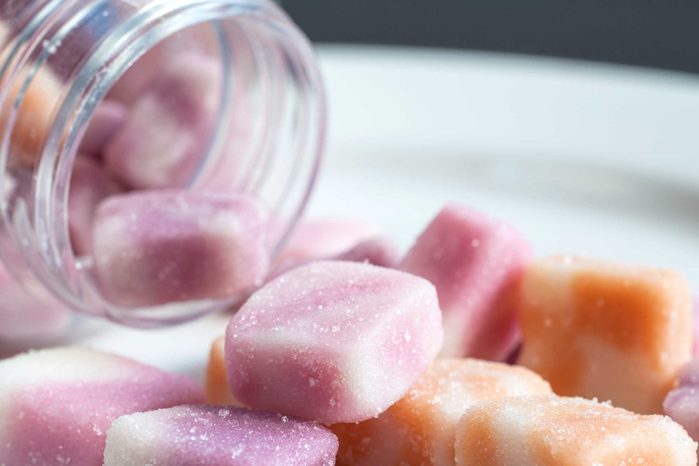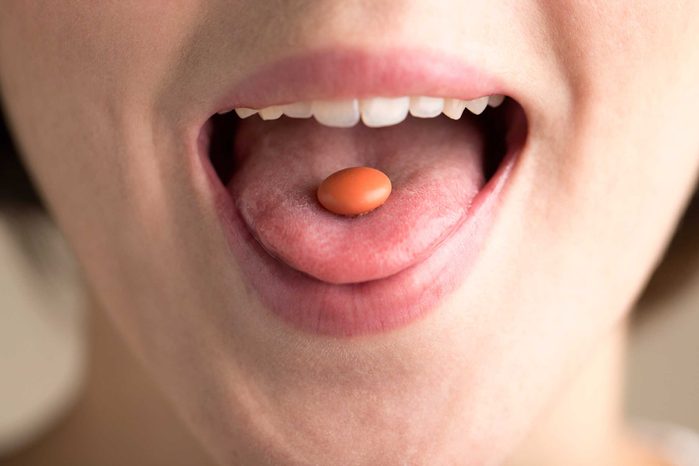
Sitting too much
When figuring out what causes constipation, the answers may be surprising. Our modern sedentary lifestyle is bad for more than just your waistline, says Atif Iqbal, MD, a gastroenterologist and medical director of the Digestive Care Center at Orange Coast Memorial Medical Center. Staying in a sitting position for long periods of time kinks up your colon, discouraging stool from passing through and causing constipation. Take regular breaks to stand up and move around. Walking and deep squats, in particular, are two movements that are particularly effective for producing a bowel movement. If constipation is a chronic problem and you don’t feel like squatting on top of your toilet, many have found relief using a “squatty potty,” which elevates the legs to a more natural pooping position. Find out what sitting is actually doing to your health.

A dairy-heavy diet
Cheeseheads, take note: Eating a lot of this melty, delicious food is one of the main explanations for what causes constipation that Dr. Iqbal gives. While all dairy products have the potential to stop you up, cheese seems to be the biggest digestive troublemaker—not because it’s inherently constipating but because many people eat it instead of healthier fibre-filled foods like whole grains and produce. If you’re eating pizza, for example, you’re probably not eating a salad. Make sure that you save room in your stomach for fibre-filled fare. Better yet, eat the fibrous foods first. (To energize your morning, try this fibre-packed green smoothie recipe.) According to a study from the Imperial College London, fibre contains an “anti-appetite molecule” so you’ll end up eating less.

Depression
If a bout of depression has you gaining weight or feeling cold constipated, there’s a reason for that. “Depression slows your overall metabolism,” Dr. Iqbal explains. Worse, the medications most commonly prescribed to treat depression are also constipating. There are many non-pharmaceutical therapies for depression that have been shown in the research to be as effective as meds. These include cognitive behavioural therapy, exercise, and meditation. Winter depression coming on strong? These experts share what to do about it.

Low-carb diets
One of the biggest complaints people have after embarking on a low-carb/high-protein diet is constipation. And for good reason, Dr. Iqbal says; eating a diet that focuses on meat, eggs, and fat leaves little room for plant fibre. Even worse, many people consciously avoid fibre-filled foods like whole grains, fruits, and vegetables because they are high in carbohydrates. Remember, all carbohydrates are not created equal. Focus on just eliminating simple carbs, like sugary treats and white bread. To keep your colon healthy and prevent constipation, make sure you get at least five servings of fruits and veggies a day. (The one exception: bananas, which can be constipating on their own.) Make sure you know these natural ways to relieve constipation.

Too much fibre
It sounds completely counterintuitive—how can fibre, a go-to constipation treatment, be what causes constipation? But overdosing on fibre can desensitize your stomach lining, making it less responsive to signals to evacuate, Dr. Iqbal explains. This is especially true when people are getting mega doses of fibre from supplements like pills or powders rather than from whole food sources. Skip the fibre pills. (These budget-friendly vegetables are a great source of fibre.) Not only is there little scientific evidence to show they work, but they may be working against you, at least in the poop department. Still backed up? Your doctor may even temporarily recommend removing fibrous foods from your diet to give your gut a chance to reset.

Chocolate
Not the best news for those with a sweet tooth: Chocolate can be constipating, although the effect appears to vary from person to person. In a recent survey done by the Rome Committee on Functional Bowel Disorders, 70 percent of people with recurring constipation reported that chocolate was a major offender. There’s no way to tell if chocolate is contributing to your constipation problem unless you completely eliminate it from your diet for a period of time. Start with two weeks and if your constipation improves, then make sure to limit the sweet stuff to special occasions. Find out if flaxseed is the answer to your constipation.

Laxatives
If you’re painfully constipated, taking a laxative may seem like the best solution. Unfortunately, this could just make your problem worse, Dr. Iqbal explains. Laxatives are meant to be used only on a short-term basis, for a week at most. Any longer and you risk making your bowels dependent, which can start a vicious cycle of constipation and diarrhea. (These are the most effective natural home remedies for diarrhea.) Before you turn to medication for constipation, it’s always best to identify what causes constipation for you and treat that first, he says. Evaluate your lifestyle, dietary habits, exercise, and medications to see what’s causing the problem before popping a laxative.

Prescription medications
All medications have side effects. And a surprising number list constipation as one of them. Antidepressants (particularly SSRIs like Prozac), anti-anxiety drugs, heartburn medications, and blood pressure pills are the most common offenders, Dr. Iqbal says. “There is always an alternative medication you can try,” Dr. Iqbal explains. “You just need to be clear with your doctor about what problems you’re experiencing.” For instance, he says the calcium in many heartburn medications can cause constipation so instead opt for ones that rely on magnesium to work. (Check out the 13 benefits of magnesium that could change your life.) Or if you’re on a calcium-channel blocker for high blood pressure, you can try a beta-blocker instead. Of course, any changes to your medications should be done under medical supervision.

Certain multivitamins
Vitamins with high levels of calcium and iron can be extremely constipating, Dr. Iqbal says, and yet many people don’t realize this and take one every day. “Certain minerals, especially in amounts over the recommended daily dosing, can slow down digestion in the large bowel,” he explains. Unless your doctor tells you otherwise, there’s likely no need to take a multivitamin every day. Find out if you’re getting enough vitamins in your diet.

Painkillers
Anyone who’s endured surgery likely knows that painkillers can cause constipation, sometimes major constipation. But this can also apply to over-the-counter meds like Tylenol and ibuprofen, as well as prescription opiates like hydrocodone and oxycontin. “These medications bind to the same receptors in the stomach, blunting the whole digestive system as well as your pain,” he explains. Painkillers should not be used longer than 30 days if possible, Dr. Iqbal says. During that time, you should make every effort to resolve the underlying injury or find other ways of treating the pain. In the meantime, take a daily stool softener along with the pain pills. Check out the best foods for improving your gut health.

Out-of-whack hormones
As any pregnant woman can tell you, hormones can do a number on your digestive system. In particular, high levels of estrogen and progesterone or low levels of testosterone can be constipating. In the case of pregnancy, the “cure” will come in nine months, but for other hormonal imbalances it’s best to cure the underlying condition first, Dr. Iqbal says. As we age, our hormone levels naturally fluctuate so if you feel out of sorts, talk to your doctor about possible therapies and lifestyle changes. These are the best adaptogens for balancing your hormones.

Undiagnosed medical conditions
A huge range of health conditions can cause constipation, Dr. Iqbal says. The most common one he sees, particularly in younger people, is hypothyroidism. “Your thyroid controls your metabolism so when it’s not functioning well, everything slows down, including your gut,” he explains. Other illnesses that have constipation as a major symptom include diabetes, multiple sclerosis, inflammatory bowel disease, celiac disease, autoimmune disorders, and some cancers. The most important thing is to identify the underlying cause and treat that. “Because constipation is so common, many people ignore it,” Dr. Iqbal says. “Most of the time it’s not a big deal but sometimes it is indicative of a larger problem.” If your constipation comes with other symptoms, has changed significantly, or if it’s lasted longer than three months, ask your doctor for a full medical work-up to look for illness. Next, learn about the 5 simple lifestyle changes that can reduce your risk of disease.
